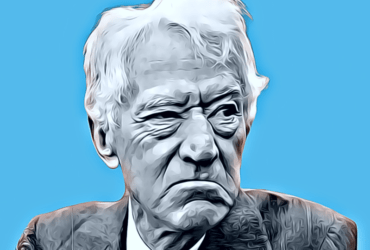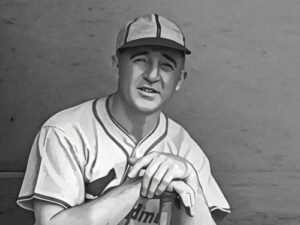The web page for Kenesaw Mountain Landis on MLB.com, official website of Major League Baseball, makes no mention of prejudice or racism. The Most Valuable Player Award, given by the Baseball Writers Association of America in conjunction with MLB, bears the Landis name.
Therein lies the problem. The Landis legacy is a complicated mix of bravado, ego, and some level of duplicity with baseball excluding blacks from the “white game.” Folks aren’t putting up with this crap anymore, and rightfully so.
This week, several former winners of the MVP Award, which bears the alliterative but troubling name of the former baseball commissioner, have called for that name to be removed from the plaque. Landis was an alleged racist who oversaw the National Pastime when MLB refused to allow black players to enter organized “white” baseball during his reign as commissioner of the sport from 1920 until his death in 1944.
How did baseball view Landis in his time? Only one month after his death late in 1944, he was elected to the Baseball Hall of Fame.
Who was Kenesaw Mountain Landis?
This wasn’t just some guy who had a strange name, looked like Burgess Meredith, and loved to give people the stink eye. Landis climbed up from modest beginnings to become a powerful federal official. That was before he landed his gig as czar of Major League Baseball.
Landis was born in Ohio, to a father who served in the Union Army in the U.S. Civil War. His name came from Kennesaw Mountain, located in Georgia. His father had been injured in a battle there.
Landis did not finish high school, but he was ambitious, and he eventually earned a law degree from the University of Chicago Union. Through connections his father made while in the war, Landis was appointed personal secretary to the Secretary of State under Grover Cleveland. In that job, “Ken” showed his diligence and made valuable relationships in Washington D.C.
He was offered a position as a foreign emissary but declined to marry his sweetheart. When an associate was offered a position as a federal judge, he suggested Landis was better suited for the job, and in 1904, Kenesaw was named to the federal bench by President Theodore Roosevelt.
A few years later, Landis pleased Roosevelt with his judicial activism. In the era of “trust-busting”, Landis slapped Standard Oil with a $29 million fine for illegal business practices. Teddy was delighted, but like many of Landis’ most outlandish rulings, it was later overturned. Nevertheless, Landis earned a reputation as a fearless judge.
Because Judge Landis was seen as a progressive judge who wasn’t afraid to ruffle the feathers of the establishment, the Federal League took their case to his courtroom when they sued Major League Baseball. The Federal League claimed the National Commission, that ruled the American and National Leagues, as well as the organized professional minor leagues, was a monopoly. The Federal League hoped Landis would break it up, but instead he stalled. Eventually the AL and NL settled with the Federal League owners, and Landis was seen as a savior of professional baseball. Largely based on that reputation, he was called upon a few years later, in 1920, to become the first commissioner.
Landis was an avid baseball fan, and he frequently attended games in his hometown of Chicago. There was a power vacuum in the game after the dissolution of the National Commission, and the Black Sox Scandal was (according to some) threatening to ruin the game. Humorist Will Rogers nailed it on the head when he discussed the choice of Landis to be the game’s caretaker.
“Baseball needed a touch of class and distinction. So, somebody said: ‘Get that old boy who sits behind first base all the time,” Rogers said. “He’s out there every day anyhow.’ So, they offered him a season’s pass and he jumped at it.”
If we listed the accomplishments that Landis achieved as commissioner, here’s what that would look like:
- He cleaned up the sport, punishing players who associated with gamblers, and coming down hard on rough play and any type of action that he felt threatened the legitimacy of the sport.
- Landis encouraged the growth of radio as a medium to spread the popularity of baseball.
- He was mindful of the dangers of the farm system, which grew into sophistication in the 1930s. Commissioner Landis used the powers of his office to free players who were trapped in the minor leagues.
But baseball, like America, was divided along lines of race in the years between the two world wars. Blacks were dealing with segregation in the south, and Jim Crow laws that still kept them as lesser-citizens. It would be years before public schools would integrate in most states, and “separate but equal” was the unofficial policy of that era. Landis did nothing to help integrate baseball.
The negro leagues were a (mostly) successful business, so Landis felt there was no need for black players to come to Major League Baseball. While he never ruled against it, he never spoke up for the rights of black players. By World War II, when many colleges and even the Army had integrated, Major League Baseball was still white.
Some historians claim Landis was a rampant racist, adamantly opposed to blacks in the game. But honestly, if we are being fair, there isn’t much evidence to prove that. Absence of evidence doesn’t absolve the man, of course.
Others claim he was complicit by his silence and inaction. That’s accurate and fair.
Some claim Landis, son of a Union soldier and born in the north, was not a racist, but rather a pawn of the owners. It was the owners, these folks claim, who really wanted to keep blacks out of the game. This notion has some support by the facts. In the early 1940s, the Phillies wanted to sign black players, but a group of owners in the National League told Landis they would never let their teams take the field if it happened. Landis quietly urged the Phillies to abandon their plan. Many MLB owners, including the Briggs family in Detroit and Tom Yawkey in Boston, were proven racists, who were never going to allow black players to be in their uniform. In 1945, the Red Sox succumbed to pressure from local activist groups and allowed a few black players to tryout at Fenway Park, one the players was Jackie Robinson. Reportedly, at one point during the workout, a voice from the stands yelled “Get those n****** off the field!” Some claimed it was the voice of Yawkey.
A story emerged during the war that the Dodgers might be looking at black players. According to one report, Brooklyn manager Leo Durocher discussed the matter with Landis.
“I told Durocher that he could hire one Negro ball player, or 25 Negro ball players, just the same as whites,” Landis said, according to the New York Herald Tribune. ‘“Negroes are not barred from Organized Baseball by the Commissioner and never have been in the 21 years I have served.”
Was Landis merely following orders from racist owners? Did he have a firm conviction (sadly like much of white America) that blacks had “their own league”? Was he secretly itching to move baseball to reconciliation with its racial problem? Was he an actual racist?
We don’t know for certain. Even his biographers and noted baseball scholars are torn on the subject. It’s worth noting that even after his death in November of 1944, no MLB team rushed to sign black players. It took nearly two more years for the Dodgers to get Jackie Robinson’s name on a contract. Perhaps Landis has become a scapegoat for the owners?
“Landis is who he is. He was who he was,” MLB official historian John Thorn told the Associated Press recently. “I absolutely support the movement to remove Confederate monuments, and Landis was pretty damn near Confederate.”
If you want to take the measure of a man, some say, you look at his actions. By that criteria, Landis fails the test. He did not move the game of baseball any closer to including people of color during his more than two decades as commissioner. He never (as far as we know) pushed the owners to accept black players. If he had, he may not have kept his job.
But that’s no excuse. If Landis was a racist, his name shouldn’t be on the MVP plaque. If he was in cahoots with owners about keeping baseball white, his name shouldn’t be there either. And if he was indifferent and didn’t bother to stand up for what was right, he was wrong too.
His legacy is entwined with baseball’s ugly pre-integration underbelly. He was not a mere participant, he was the highest official in the game. He’s culpable, and the people asking baseball to remove the name of Kenesaw Mountain Landis from their Most Valuable Player Award are correct to do so.






